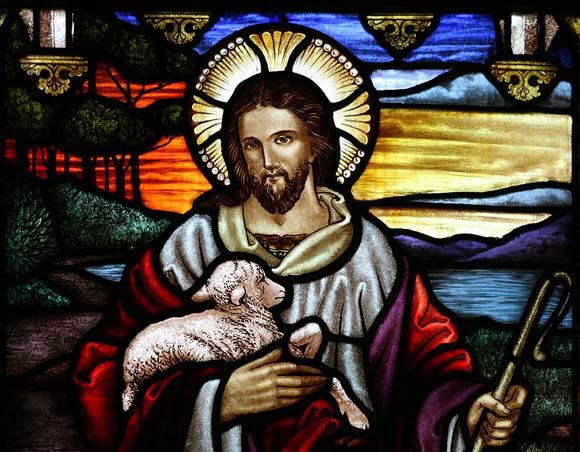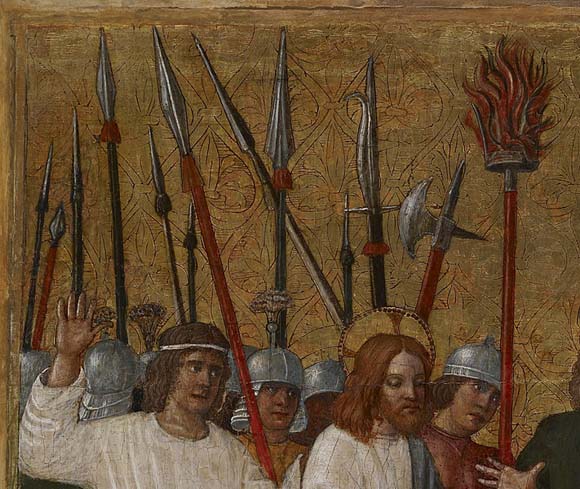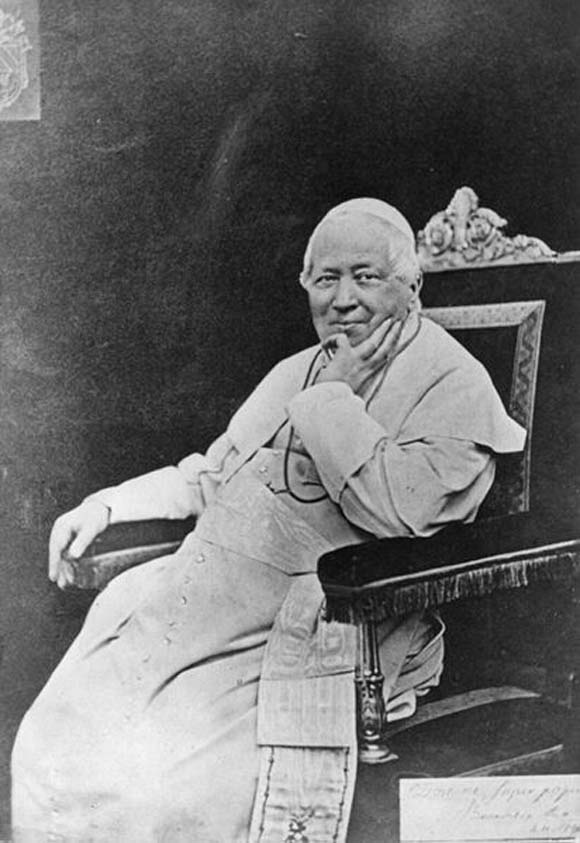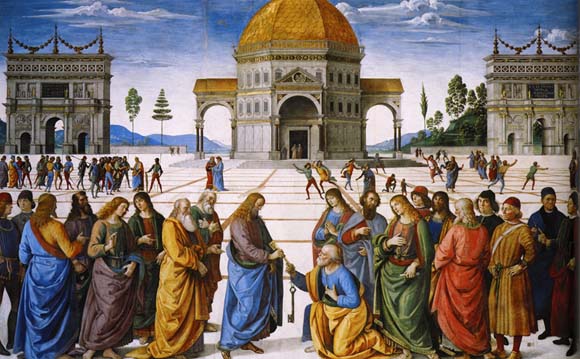
Saturday of the Fourth Week of Lent
617
Today’s Gospel begins at John 7:40 in the middle of a series of interchanges. It opens: “When they heard these words, some of the people said, ‘This is really the prophet.’” Despite this leading introduction there is no account in today’s reading as to what “these words” uttered by Jesus were, leaving today’s listener puzzling over what Jesus could have said to convince so many.
The answer is not even to be found in the previous day’s Gospel which concluded at John 7:30. So what happened in the missing ten verses? Jesus, facing arrest, proclaimed to the assembled peoples: “If any one thirst, let him come to me and drink. He who believes in me, as the scripture has said, ‘Out of his heart shall flow rivers of living water.’” St John clarified that here Jesus refers to the gift of the Holy Spirit which was to be given after Jesus had been glorified (John 7:37-39).
 |
| Christ with the soldiers. |
It is interesting that this promise managed to convince those who were sent to arrest Jesus of his status as a prophet, some even going so far as to proclaim him the Christ. Yet, despite the soldiers’ testimony that “no man has spoken like this man” the chief priests and elders of the Jews could not see Jesus as anything other than a false prophet and agitator. None of the authorities, those who knew the Law, had gone over to follow Jesus’s teaching. Clearly then he was a false teacher only able to inspire loyalty in the unlearned common folk. St. Augustine comments that the inability of the Jewish leaders, who were teachers of the Law, to recognise the Lawgiver made manifest Christ’s words “For judgment I came into this world, that those who do not see may see, and that those who see may become blind.” (John 9:39)
This set of events might kindle a distrust of religious authority. It was the religious leaders of Jesus’s day, it is often said, who handed him over to his death. Would the bishops and popes of our day fare any better?
 |
| Blessed Pius IX |
For the Catholic Church, which is by design an hierarchical institution, these sort of questions can be quite prominent, even in discussion amongst believers. Lord Acton argued that one ought to regard the bearer of authority with more suspicion than any other: “Power tends to corrupt and absolute power corrupts absolutely” he said during discussions on Papal Infallibility, as defined at the 1870 Vatican Council under Pius IX. “The office does not sanctify the office holder.”
Dostoyevsky gave a negative assessment of the Catholic hierarchy in his short story about the Inquisitor. There an inquisitor, who had arrested Jesus after the second coming, told Christ that the Church did not need the Gospel, it had moved beyond Jesus and his ‘false’ hope and ‘false’ answers to suffering. For the Inquisitor Jesus was in effect a false prophet- just as the Jewish leaders had said.
What are Catholics to make of all this? Well, the answer is perhaps found in today’s Gospel. What were the words that gave hope to the soldiers of the Pharisees? It was, we learn from St. John’s clarification, that Jesus would grant those who followed him not just the saving Faith, but that he would maintain that Faith in them untainted, like living water. The soldiers had experienced their own priests and they perceived their lack of authority. Jesus offered them a liberation from the human weakness which had best the Jewish priests and blinded them to God; the guidance of the Holy Spirit.
Catholics have to accept that their leaders can fail. No matter how charismatic or impressive the priest, bishop or pope is they cannot be relied upon as they are in themselves. Indeed, no Christian would claim for himself the power to stay faithful to God without the help of grace. Thus Christians rely on the bishops and pope as protected by the Holy Spirit. Christians ultimately put their faith only in the authority of Christ, for he alone is always faithful. It was he who promised the protection of the Spirit and he who promised that the powers of hell would not prevail against his Church. We can trust the earthly leaders of the Church precisely because we know that Jesus does not renege on his promises. He said “My sheep hear my voice, and I know them, and they follow me” (John 10:27). It is through the Church that Christians have access to the same vivifying words that converted the soldiers of today’s Gospel and thus, provided they be in the bosom of the Catholic Church, Christians in any age in any place can know Jesus, recognise and say of him “no man has spoken like this man.”



